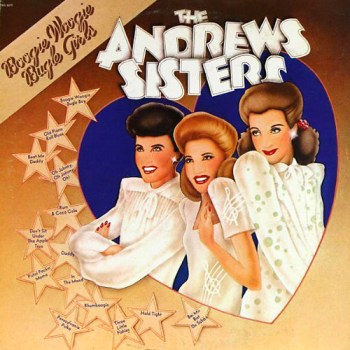
When “a famous trumpet man from out Chicago way” got drafted into the Army and was made a bugler, “It really brought him down because he could not jam.” So the captain “went out and drafted a band.” Now that the bugle boy has his sidemen, “the company jumps when he plays reveille. / He’s the boogie woogie bugle boy of Company B.” The happiest, heppest World War II song, written by Don Raye and Hughie Prince, actually predated Pearl Harbor by almost a year: the Andrews Sisters performed it in the Jan. 1941 Abbott and Costello comedy Buck Privates, the year’s biggest movie hit. The song’s message — that the U.S. Army would welcome all comers and let them do their own thing — survived the war by decades. A hit again for Bette Midler in 1973, “Bugle Boy” also inspired Christina Aguilera’s naughty-nostalgic “Candyman” in 2007.
From Minnesota, Patty, Maxene and Laverne Andrews based their early style on the close harmonizing of the Boswell Sisters, but even tighter and often with a jump beat. They had a No. 1 hit with the Yiddish tune “Bei Mir Bist Du Schoen” and found their ideal composer in Raye, who filled out their catalogue with jive novelties like “Scrub Me, Mama, With a Boogie Beat” and “Mister Five by Five.” “Bugle Boy” was a near-duplicate to another Raye song for the trio, “Beat Me, Daddy, Eight to the Bar,” about a Texas pianist “but the way he likes to play is eight to the bar.” The sisters often served as Bing Crosby’s backup group in both ballads and novelty songs. To the crooner, they were the three-headed musical equivalent of Bob Hope: Bing’s foil and equals. And like Hope they were tireless entertainers of the troops overseas. The Sisters’ comic verve sent messages of solidarity and cheer from the home front to the war front.
[youtube=http://www.youtube.com/watch?v=kTrx8jgpvBk]

